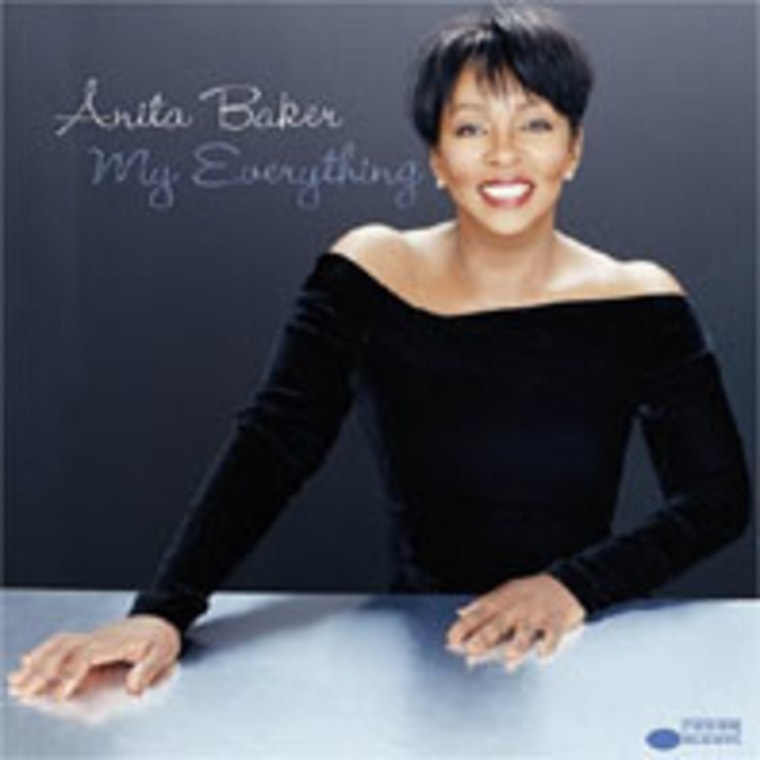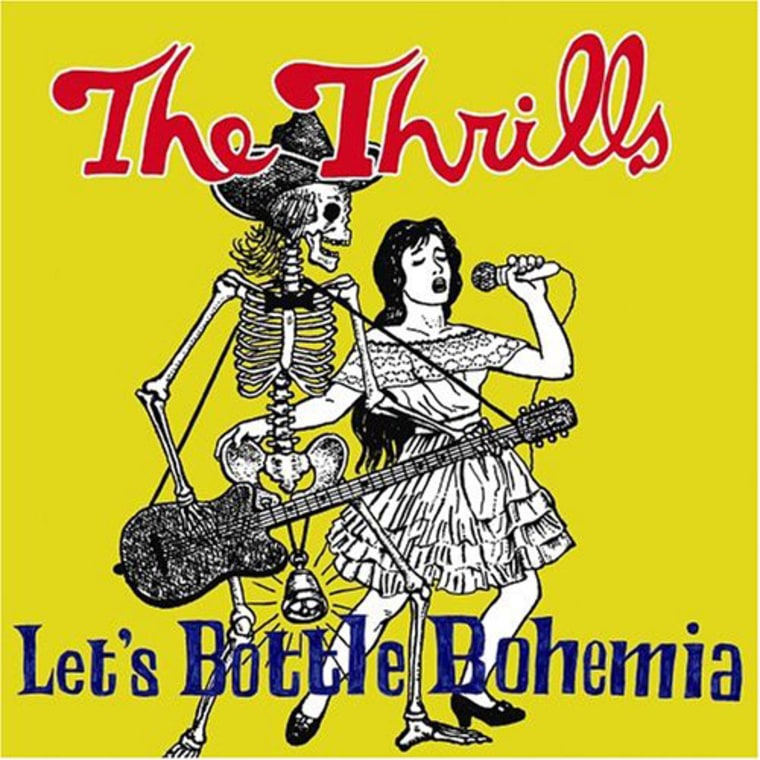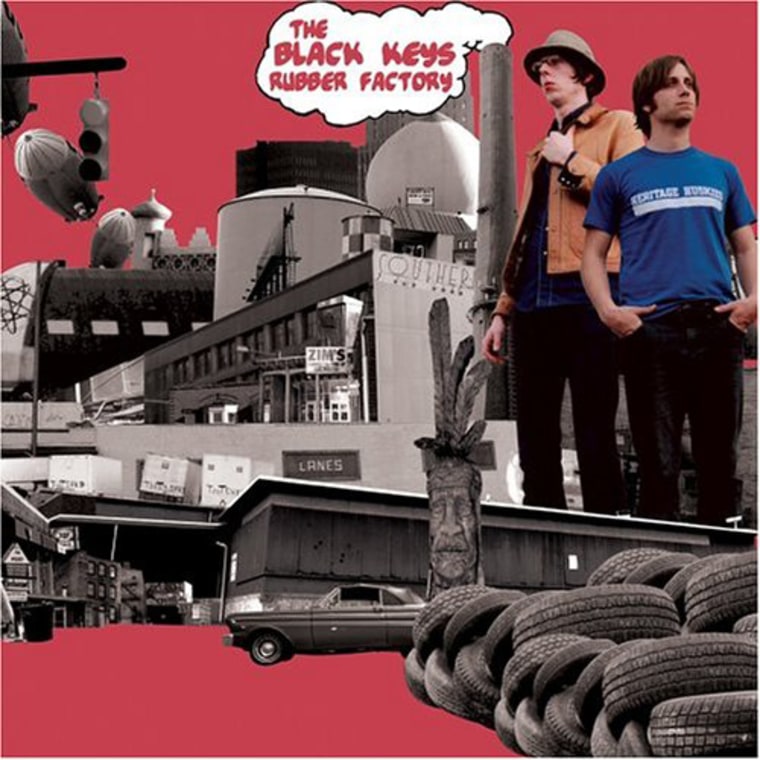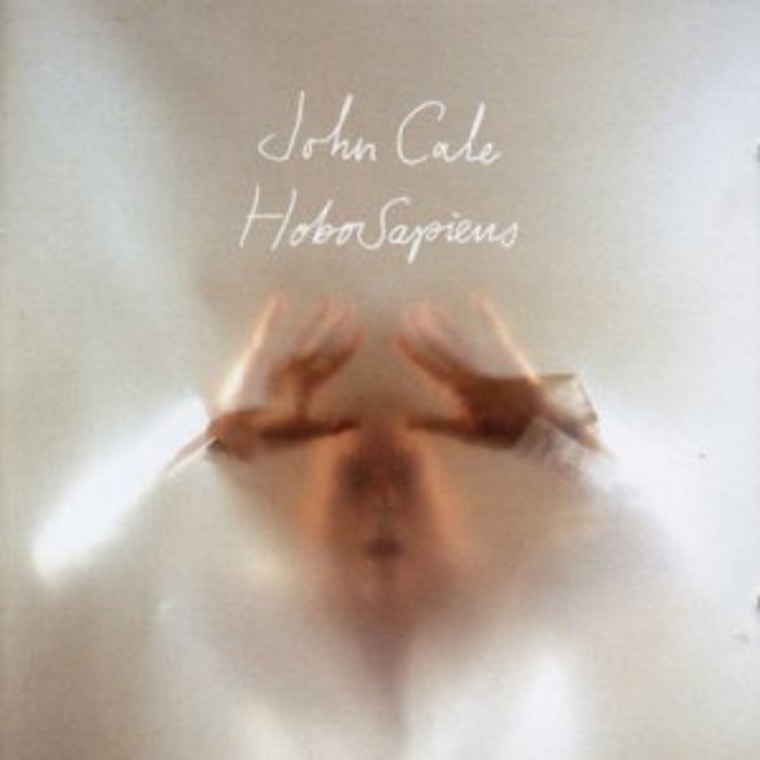Anita Baker comes out of retirement to sing about her specialty — love, The Thrills uncork "Bohemia," The Black Keys deliver a bluesy bounce in "Rubber Factory" and John Cale offers a brooding palette in "HoboSapiens" in this week's new releases.
“My Everything,” Anita Baker
During her 10-year break from recording, soul siren Anita Baker traded the limelight for a starring role as doting wife and mother. The Grammy winner’s comeback disc, “My Everything,” reflects her family values.
The upbeat title song is a Valentine to her husband and “Men in My Life” is a saccharin dedication to her two sons. But in this bootylicious era, where tabloid headlines attract more attention than talent, will the smoky-piped Baker’s sentimental musings keep R&B enthusiasts interested? That depends on who’s listening.

While Baker’s rich, gospel-informed contralto remains timeless, and she earned cool points with the TRL set thanks to a shout out in the Twista and Kanye West hit “Slow Jamz” (“a little Anita will definitely set this party off right”), “My Everything’s” smooth-jazz production is strictly for the over 30, adult-contemporary-leaning crowd.
At times the music fails to reach the same heights as Baker’s soaring vocals. “Like You Used to Do” is a bland duet with Babyface, and “How Could You” is a lifeless attempt at doo-wop. The production does, however, rise to the occasion on several of the disc’s 10 songs.
The Latin jazz-tinged “In My Heart” recalls Rapture’s simmering “Been So Long,” and “Close Your Eyes” is vintage Baker: The song’s building, quiet storm arrangement perfectly complements the chanteuse’s smoldering, skat-inclined vocals. On that latter track, she muses, “be free to follow what you feel,” and although the results are mixed, she gives “My Everything her all.”— Tracy E. Hopkins
“Let’s Bottle Bohemia,” The Thrills
There’s nothing that thrilling about The Thrills’ sophomore CD, “Let’s Bottle Bohemia.” But that doesn’t mean it shouldn’t be uncorked.

“Let’s Bottle Bohemia” is Beach Boyish pop-rock fare that’ll make you want to wax a surfboard or put the top down. This Irish brood sounds just as All-American as the Partridge Family. During the 10-track disc, there’s much oohing and ahhing reminiscent of Keith, Laurie and the other shaggy-haired kids. This is what The Thrills do best.
Somewhere there’s a message in “Let’s Bottle Bohemia.” Vocalist Conor Deasy’s lyrics reek with irony and humor. During “The Irish Keep Gate Crashing,” Deasy laments: “Lust, top 40 fame/I can smell your Catholic shame.” Intriguing!
“Found My Rosebud” is a happy ditty about New York with lyrics seemingly transplanted from a country song. “So for the first time in my life, feel like a country boy caught in headlights,” Deasy cackles in the most un-Bono manner as possible.
The Thrills effectively blend low-fi guitars and pop-piano pounding on songs such as “You Can’t Fool Old Friends with Limousines” and “Whatever Happened to Corey Haim?” However, the sound falls flat on the Coldplay imitation “Not For All the Love In the World.”
Although Keith Patridge incited tweens of the 1970s to scream and beg for more, the repetition of “Let’s Bottle Bohemia” will rouse listeners to eventually look elsewhere.— Derrik J. Lang
“Future Soundtrack for America,” Various Artists
Imagine a sit-in led by MTV talking heads or a foreign policy debate with panel contributors taken from Rolling Stone and you’ll have a fairly concrete picture of the political message behind the “Future Soundtrack for America.”
The brainchild of John Flansburgh of They Might Be Giants, the album is a fund-raiser for a list of nonprofit organizations including Moveon.org, Common Assets and the Sierra Club. It features 22 unreleased tracks from artists ranging from Tom Waits and David Byrne to Blink-182 and The Flaming Lips.
But while the album has something for every musical taste — nowhere else will you find Death Cab For Cutie and R.E.M. together — few of the album’s songs contain overt messages adhering to one political goal. And those that do feel as politically ineffective as starting a debate with, “Dude, war is wrong.”
Laura Cantrell’s “Sam Stone” is a old-timey ballad of a soldier returning from war and developing a drug problem. It’s touching, but a little antiquated. And The Long Winter’s remix of “The Commander Thinks Aloud” has a clever title, but lacks the impassioned lyrics that would get anyone to up to speak their mind.
That isn’t to say the album isn’t without something good. The late Elliott Smith’s “A Distorted Reality Is Now A Necessity To Be Free” cries out with last-ditch despair and sincere sentiment. And Tom Waits’ “Day After Tomorrow” is priceless.
Yet for some reason the album feels like Woodstock with a corporate sponsor. But even Woodstock had a soundtrack, right?— Ryan Lenz
“Rubber Factory,” The Black Keys
Listening to the uninhibited blues of The Black Keys, the same question runs through your head again and again: this is two white guys from the Midwest?

The band’s third album, “Rubber Factory,” comes, as their last did, on Fat Possum, a label known for mining old, forgotten blues men in the Mississippi Delta. Guitarist and singer Dan Auerbach and gangly, bespectacled drummer Patrick Carney, however, are twenty-something lawnmowers from Akron, Ohio.
But their three-minute songs of greasy stomp and raw blues is 100 percent authentic. While two-person bands are oddly in vogue and neo-blues is all the rage, The Keys simply are electrified blues, sans the retro fitting.
Auerbach’s primal howl comes from wherever John Lee Hooker and Muddy Waters got their’s. This is the kind of CD where one of five instruments credited is “hand claps.”
The range of a two-man blues band, though, is limited. All the bent notes and groans can lose some of their immediate lightning effect.
But Auerbach and Carney slow it down on “The Lengths,” a bluesy ballad that may make you resign yourself to a happy life on the porch forever. The effect is similar on a cover of The Kinks’ “Act Nice and Gentle.” The lap-steel guitar on the track tickles it’s so soothing.
And a word has to be said about the bridge to “Grown So Ugly,” a cover of one of those old Delta Fat Possum men: Robert Pete Williams. The 30 seconds of that song’s unexpected left-hand turn is one of the sweetest segues in rock ’n’ roll history.
Well, that may be a bit strong, but that’s the kind of response The Black Keys breed. This simply cannot be two white boys from the Buckeye State. It can’t.— Jake Coyle
“HoboSapiens,” John Cale
On his first U.S. release in eight years, John Cale sings about Archimedes, Rene Magritte and Charlie Brown, Crete, Zanzibar and Afghanistan, obsession, religion and liberation.

In lesser hands, such a broad palette would merely make a mess. Cale is an old pro, though — it’s been 40 years since he co-founded the Velvet Underground — and his enigmatic muse has inspired quirky but captivating music on “HoboSapiens.”
The album is reminiscent of Peter Gabriel’s best work: ambitious and sophisticated, yet accessible and leavened with enough humor to keep the mood from becoming too heavy. Cale employs a bicycle bell for percussion and doo-wop vocals, and it’s hard to take seriously a couplet such as: “Mustn’t be late for the caravan/mustn’t be early for the garbageman.”
Elsewhere Cale’s lyrics are characteristically opaque but full of interesting people, places and ideas. The music includes drum loops, wordless singing, eerie keyboards, sound effects and a kazoo, and the results are inventive, edgy and sometimes beautiful.
At 62, Cale has produced one of the best records of his career.— Steven Wine
“The Underground Spiritual Game,” Fela Kuti/Chief Xcel
There’s only one Fela.
And Chief Xcel, mixmaster for Bay Area hip-hop duo Blackalicious, has created a great introduction to him for the uninitiated. “The Underground Spiritual Game,” an 11-track mix compiled by Xcel of selections from the late father of Afropop, lets Kuti’s music make its own case with some of the deepest grooves ever recorded.
Kuti, a Nigerian native, found the nexus of traditional African music and American funk — now called Afropop. He recorded more than 70 albums from the ’60s to the ’90s as a vocalist, multi-instrumentalist and bandleader.
The music he created while heading the bands Koola Lobitos, Africa 70 and Egypt 80, stripped down funk to the essentials. Bass thumps with repetitive beats, hand drums, shakers and percussion. To this Kuti added intricate horn sections and groups of men and women singing call-and-response backing vocals.
Kuti’s own singing mesmerizes like his band. His voice, heavy with a Nigerian accent, carries strong and clear over the music. It twists and turns, goes up and down octaves, mixing languages and noises.
Like the best DJ’s, Xcel’s hand is invisible. He moves from song to song, linking similar grooves, sometimes using brief parts of a Fela track, sometimes large sections as on the 17-minute-plus “Africa Centre of the World.”
“The Underground Spiritual Game” succeeds because Fela Kuti already made some of the world’s best live dance music. All Chief Xcel had to do was cue the disc and play it.— Mark Donahue
“Master of the Moon,” DioAdd this to death and taxes on the list of sure things: When Ronnie James Dio records an album, it’s going to be great. The latest in a 30-year reign of heavy metal brilliance, “Master of the Moon” includes his most overtly political song ever, “The Man Who Would Be King,” a blistering denunciation of President Bush and the Iraq war.
Taking the form of a penitent praying to God for forgiveness, the track includes lines like “We never got an answer/It’s just too late to ask/The bloody flag was waving/Our hearts just ran too fast/Forgive me, Father, for the change we bring/But it’s all for the man who would be king.”
Reunited with longtime guitarist Craig Goldy, Dio’s voice is as soaring and howling as ever, and the lyricism and poetry of his songwriting continues to impress. Themes of the individual raging against helplessness and smallness, and the constant clash between good and evil have been a constant in Dio’s work, both solo and during his stints with Black Sabbath and Rainbow. Both are present here on the title track and “I Am.”— Wayne Parry
“The Color of Music,” John P. Kee
“The Color of Music,” the first solo album in over a decade from gospel veteran John P. Kee, is less about pushing the envelope of contemporary gospel than expanding its borders for a new generation.
In the 1980s, Kee and his “New Life Community Choir” added high-energy vocals, synthesizers and drum loops to the mix and redefined contemporary gospel. On this album, Kee matches musical wits with today’s artists like Deitrick Haddon and Tonex, who infuse gospel with rock and urban styles, then adds a few genres more familiar to his generation: reggae, ’70s popular music and gospel quartet-tinged cuts.
“Dancin”’ will make you want to do just that, and Kee lets loose on “Never,” a laid-back urban jam. Unfortunately “Momma’s Choice” sounds a lot like one of those demo songs that come with an electric keyboard. But overall, the album is a much welcome return by one of the greatest artists in the genre.— Aimee Maude Sims